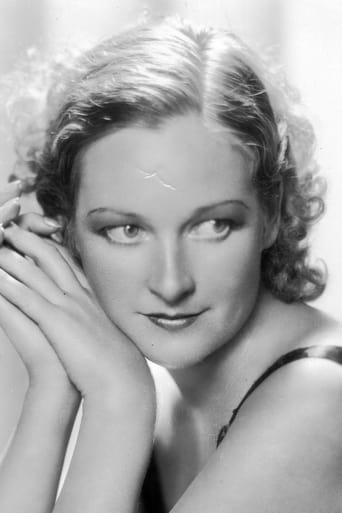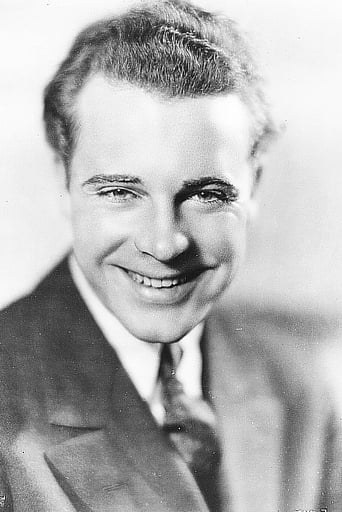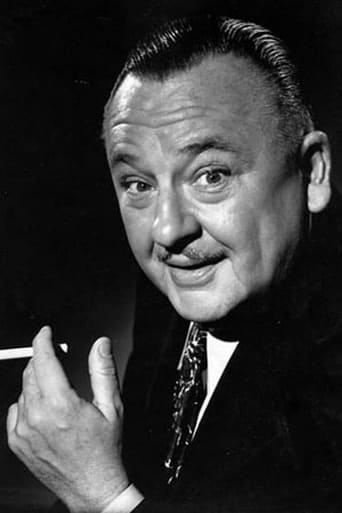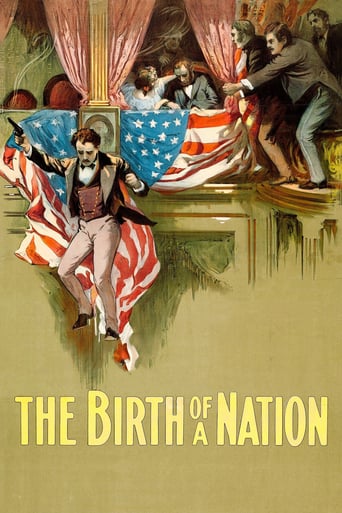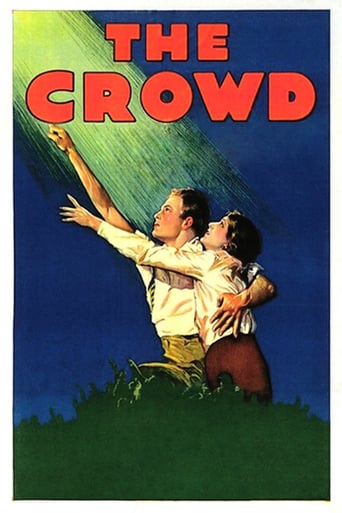
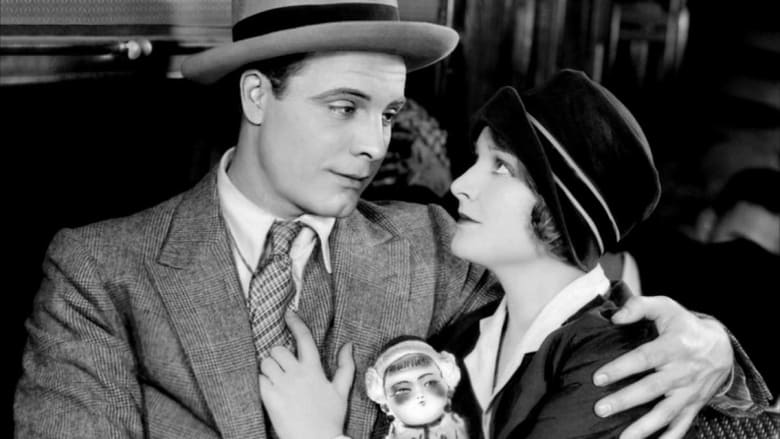
The Crowd (1928)
John, an ambitious but undisciplined New York City office worker, meets and marries Mary. They start a family, struggle to cope with marital stress, financial setbacks, and tragedy, all while lost amid the anonymous, pitiless throngs of the big city.
Watch Trailer
Cast


Similar titles
Reviews
Such a frustrating disappointment
Simply A Masterpiece
It was OK. I don't see why everyone loves it so much. It wasn't very smart or deep or well-directed.
While it is a pity that the story wasn't told with more visual finesse, this is trivial compared to our real-world problems. It takes a good movie to put that into perspective.
By the time King Vidor came to direct The Crowd, he'd cast his wife, Eleanor Boardman, in maybe a dozen of his previous movies. Moreover, after The Crowd, he never cast Boardman again in any production (they divorced in 1935). So this remarkable movie is thus even more so for those reasons.And truly remarkable, this movie is: a grim story of the ultimate banality of 20th century city life for a young couple, John and Mary Sims (Murray and Boardman); and yet, ironically, produced at the zenith of the 1920s excesses, just prior to the Wall Street crash of 1929 and the subsequent Great Depression of the 1930s. Frankly, King Vidor couldn't have timed its release better, in my opinion, (it's like if some famous director, in 1999 or 2000, had released a terrorist attack movie on New York's Empire State Building or some other major land mark) with such a contemporary indictment of modern capitalism. So there's John Sims, always with a burning desire to Be Somebody. As a young man, he leaves home to make it big in New York, that go- getter, capitalist Mecca of the 1920s, with over seven million residents - all competing for space, jobs, money and ... sex. And maybe marriage, also, if only a guy could just meet the 'right' girl, yeah!He's lucky, he thinks. He's persuaded to go on a blind date with a work buddy and - bingo! - he hits it off with Mary, a gorgeous brunette with a terrific smile. Next thing we know, they're married. Few years later, they've got two kids - boy and girl, of course - a house, picnics on the beach, a few family spats here and there, but also the beginnings of The Good Life, The American Dream. And his job - as an accountant (well, just a lowly clerk, is all) in an office that looks like a giant human assembly line of piles of paper. He's at Position #137, day in, day out, rain or shine, scenes that are reminiscent of Fritz Lang's crowds of worker scenes in Metropolis (1927).Mary does her best at home, he does likewise at the office. Gradually, amid personal tragedy - their little daughter is killed by a truck - and continual frustrations about his lack of progress, John finally realizes he's not a Big Shot, and probably never will be - only ever to be a member of the amorphous crowd that's already causing major traffic problems. Problem is, Mary also finally realizes John's a loser, with a devastating result for him: she says she's leaving him. Tearfully, though, John pleads with her to come see a show with him, holding up the tickets, already purchased. Eventually, she agrees, and with the son, all three wind up at the local vaudeville show, and as the camera slowly pulls back from their happy faces, we see them laughing along with the gigantic crowd in the dark theater, and now, all captive to the consumer society.... Fade to black, The End.It's a well produced story and movie, with finely orchestrated crowd and city scenes, a well paced plot - just right at 98 minutes - excellent photography, editing and directing and probably one of the few silent movies that ends with a cliff-hanger: will Mary still leave John when the show finishes? Perhaps Vidor made a sequel, but I don't know.One could argue that Vidor was too heavy-handed with the story being excessively negative about the shortcomings of burgeoning modernity. Depends where you were, socially and economically, at that time, I guess. Modern society in the 21st century has generated more wealth for sure; there are still obvious problems, however. Which therefore makes this movie timeless and thus well worth your time to see it - even if you do shy away from silent movies.Recommended for all. Give it seven out of ten. May 23, 2016
In 1928, King Vidor made "The Crowd," a movie about John and Mary Sims, and then made "Our Daily Bread" in 1934, which is a movie about the same married couple. Different actors play the roles in the two movies, but even if they had been played by the same actors, the second movie really does not seem to be a sequel to the first, especially since the son they had in the first movie is inexplicably missing in the second."The Crowd" is basically about a man, John Sims, who thinks he will make it big in the big city. In fact, his father expresses those big dreams for him when he is born on July 4, 1900, as propitious a birth date as one could want. As a child, his life is compared, somewhat superficially, with George Washington and Abraham Lincoln. At the age of twelve, he expresses his dream of being big himself. That is the day his father dies, suggesting that our dreams have a way of being interrupted by the harsh realities of life.An intertitle sarcastically announces that John has become an adult, and that he is one of the seven million people in New York who believes the city depends on them. That is a stretch, because a lot of people have no such illusions, but John certainly does. He ends up with a job in which he is just one of a thousand people. All in all, it is not a bad job: he works indoors, sitting down, no heavy lifting. He even has the opportunity to steal a little time from his boss trying to win a contest coming up with a good advertising slogan. And there is no overtime apparently, because at the moment the minute hand indicates it is 5 o'clock, everyone leaves his desk and heads for the exit.Bert works in the same office with John, and he lines him up with a blind double date, where John meets Mary. Though Bert is a fun-loving guy, yet he is a better worker than John and eventually gets promoted. Furthermore, Bert is not contemptuous of other people the way John is, sneering at the crowd and remarking to Mary that most people are a pain in the neck. John sees a man juggling balls with an advertisement on the clown suit he is wearing. He points out that the poor sap's father probably thought he would grow up to be president. Much in the way that Stanton Carlisle (Tyrone Power) is destined to become the geek in a sideshow in "Nightmare Alley" (1947), so too is John destined to become the juggler in the clown suit as punishment for his derisive remark.After kissing Mary a couple of times and seeing an advertisement ("You furnish the girl, and we'll furnish the home"), John asks Mary to marry him. They get married, but there is no home to furnish, only a small apartment with a Murphy bed, where John dreams about the big house he thinks they will eventually own. After a while, it all starts to get on their nerves, and they start quarreling, although John is the one who does most of the complaining and sniping. They almost split up, but then Mary tells John she is pregnant, and so they make up. They have a son and soon after that a daughter. And soon after that, they start quarreling again, with Mary growing weary of John's dreams about making it big while Bert actually got a promotion.While at the beach, John starts juggling balls to amuse his children, recalling the geek motif of the juggler in the clown suit. Nevertheless, John comes up with an advertising slogan based on juggling balls, and it wins him five hundred dollars (about seven thousand dollars, adjusted for inflation). After John buys some presents, they call their children through the window to come and get the toys he bought them. Heedlessly, the children run across the street, and their daughter is run over by a truck and killed.After a few months, John is still so upset that he cannot do his job. Even though Bert is now his supervisor and would probably be understanding, John quits before Bert can say anything, throwing a tantrum, flinging his ledger on the floor, and saying, "To hell with this job." Oddly enough, when he gets home, Mary is in a great mood as she prepares food for the company picnic. We have to wonder, if Mary has recovered well enough to think about having fun, why can't John at least go to work and do his job? In any event, John tries to get work elsewhere, but fails at one job after another, once again putting stress on the marriage. In some ways, this reminds us of "Penny Serenade" (1941) and "The Marrying Kind" (1952), two movies in which a marriage ends up on the rocks on account of the death of a child. Like those two movies, the idea is that a good marriage can ultimately survive such a tragedy.Mary tries to make ends meet by sewing dresses while John hangs around the house depressed. Her brothers come by and offer John a job, but he turns it down because it is a "charity job." John leaves and almost commits suicide by leaping in front of a train, but ends up finding work juggling balls in a clown suit. He goes home to find that Mary is leaving him to go live with her brothers. He talks her into going to a show with him, having purchased the tickets with the money he made, and at the theater having a good time, they see his advertisement of the clown juggling balls in the program, suggesting that he might succeed again in the future.
The Crowd (King Vidor, 1928) I couldn't help but compare the marriage storyline in The Crowd to the one in Murnau's Sunrise, which I also recently watched. There is an impressive realistic approach taken to both. John and Mary in The Crowd run the full gamut from flirtation to tenderness to irritation to alienation, and back again. The first half hour is mostly lighthearted, but later takes some serious turns that are all the more affecting for having been preceded by the comedic touches of some of the early scenes. John shows a lot of arrogance without the ambition to back it up, which of course comes around to bite him eventually. I was not prepared for a certain tragic event, and it stunned me a little. Vidor does a great job depicting the anonymity that can often be found in the workplace, especially when you see rows upon rows of men in suits working at identical desks. Some have said that The Crowd has a downbeat ending, but I would have to disagree: to me it is just about the most positive ending that could follow from the events of the film. If you enjoy silent movies, you must see this wonderful comedy-drama from the days just before the talkie took over for good. 9/10
Probably the best film ever made. When John Sims, as a child is sitting on a fence surrounded by friends talking about their dreams and lofty ambitions, he says "my dad says one day I'm going to be somebody big". It is this belief that great things are going to happen to him without him having to strive for success that may be John Sims downfall. He doesn't have the talent or ambition to lift himself out of the crowd, all he has are his dreams. Through the film, events indicate that John is going to make his mark on the world. The first scene shows people passing the Sim's house to celebrate the 4th of July - the title announces something even greater is taking place inside - the birth of John Sims. The father then predicts the world is going to hear from the "little man".A shabbily dressed stranger on a steamer warns John, now 21, "You got to be good in that town if you want to beat the crowd". There is an expressionistic feel as the camera pans up the skyscraper, zooms into a window and singles out John Sims at work, just one of many, sitting at his desk. At this stage he is planning to get ahead by studying at night. Then he meets Mary - on a bus ride he jeers at a man in a clown costume - "I bet his parents thought he would grow up to be President", little knowing that one day he would be forced to take a similar demeaning job.Slogans abound in this film. When you first meet John, he is working on a competition slogan. Seeing an ad in the train "You furnish the girl - We furnish the home" makes him think of proposing to Mary, and on the honeymoon trip "time to retire" hastens him to the bathroom, where some men pass him a copy of "What a Young Husband Ought to Know".He doesn't get on with his in-laws, they don't think he'll amount to much. He is always dreaming of making it big but it is all talk - at the beginning he is shown to be a clockwatcher.Five years pass - he now has a little boy and girl but his friend has been promoted while he is still stuck in the same rut with only an $8 a week raise. At a beach picnic, where only the children enjoy them- selves Mary calls his bluff and encourages him to send in one of his slogans. He does and wins $500 but their joy is short lived as their little girl is run over by a truck. John, who is suffering from depression, quits his job but Mary is still supportive. He finds he can't stick at anything, they move to a shanty and Mary is forced to take in sewing. After rejecting a job from Mary's brothers, they fight and John attempts suicide. He is stopped only by the cries of his child and through the love and belief of his little boy John is now determined to get a job and succeed.The strength of James Murray's acting is overpowering. King Vidor called Murray "one of the best natural actors I had ever had the good luck to encounter". What happened to him was so tragic, when you look at his performance in "The Crowd" - he was capable of real greatness. At the end Mary can't bring herself to leave John, she realises that he is dependent on her and with all his faults and failures she still loves him. Eleanor Boardman is magnificent as Mary. When you first see her she is a gum chewing, almost coarse girl but as the film progresses you see her through John's eyes and without any change in her appearance she becomes beautiful.Apparently the film caused a stir for being the first American film to show an indoor toilet!!!Highly, Highly Recommended.


